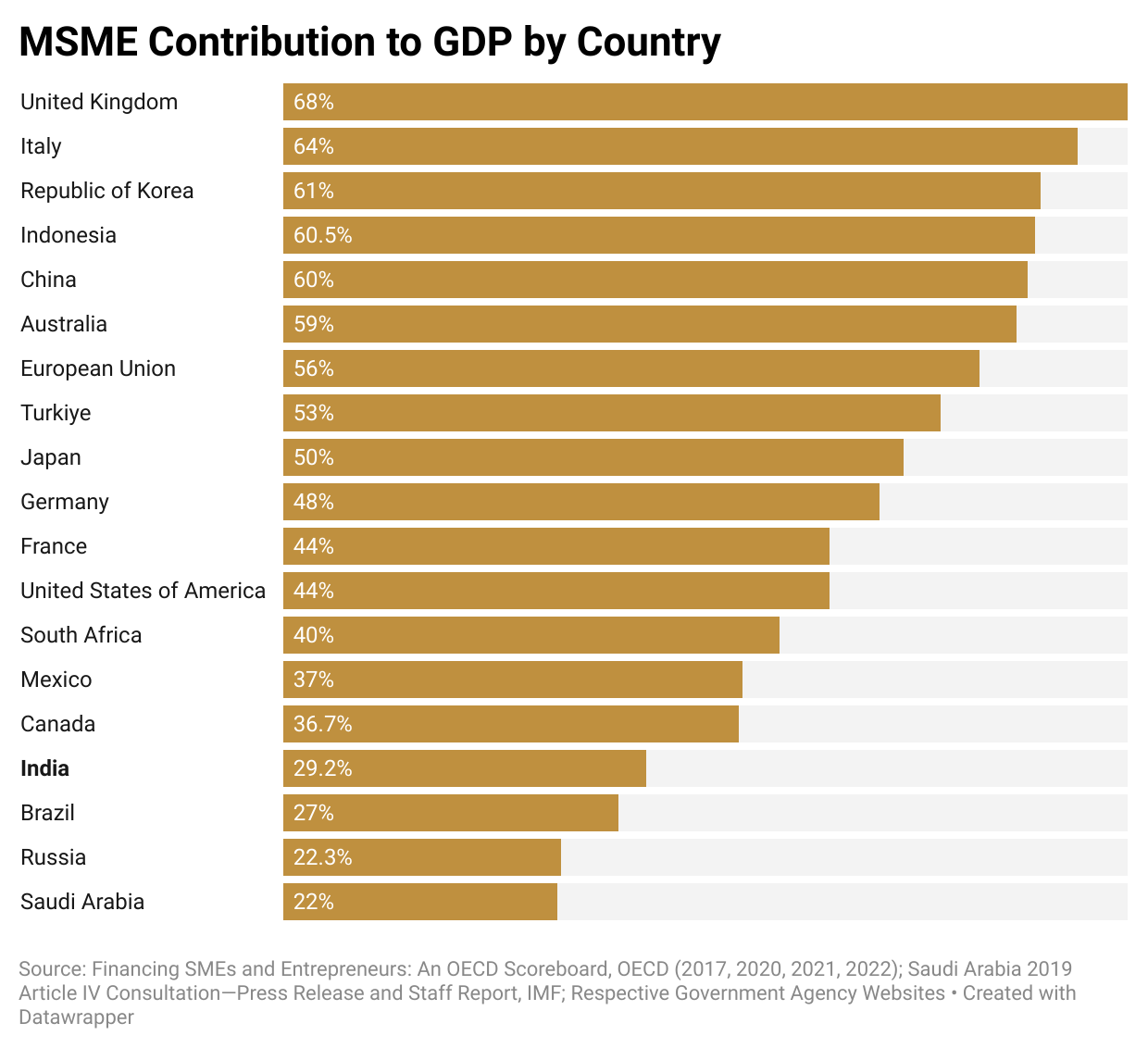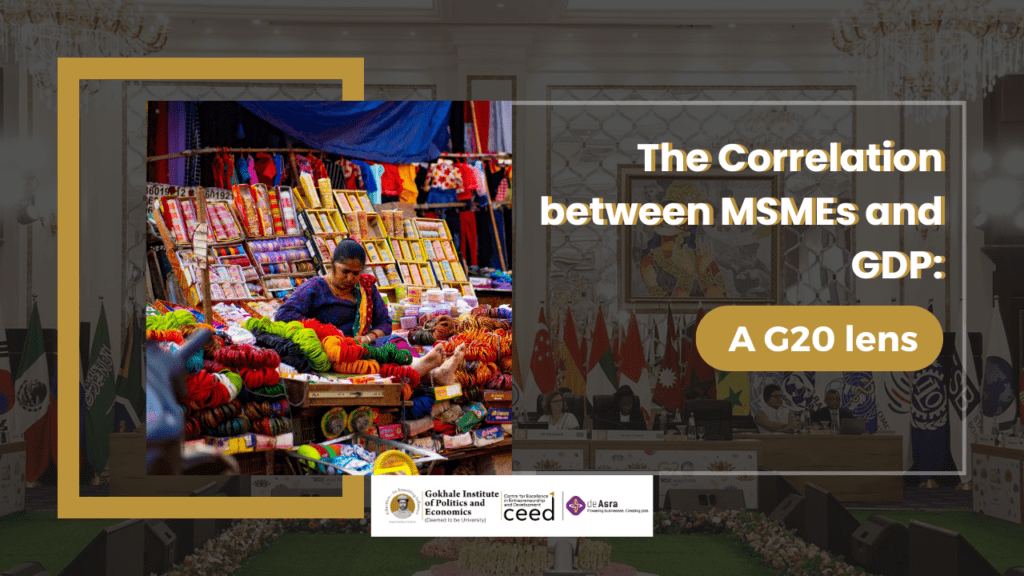The European Union and 19 other nations make up the G20, also known as the Group of Twenty. It serves as a forum for dialogue on various international issues and for international economic cooperation. India hosted the G20 New Delhi Summit on September 9 and 10, 2023. The summit concentrated on significant issues like climate change, low-income country economic development, and the ongoing effects of the war.
The release of the G20 New Delhi Leaders’ Declaration was one of the summit’s major outcomes. In this declaration, the G20 member nations outlined their common goals and commitments, highlighting the importance of working together to address climate change, advance sustainable development, and guarantee inclusive growth.
Additionally, opportunities for Micro, Small, and Medium-Sized Enterprises (MSMEs) in India were presented by the G20 New Delhi Summit. MSMEs are essential to the Indian economy and make a significant contribution to job creation and economic expansion. The New Delhi Declaration also emphasized how MSMEs and startups are the main forces behind employment growth and innovation, which results in socioeconomic development, thereby referring to them as “natural engines of growth.” . The Declaration also states that the G20 countries will commit to promoting digital technology among farmers and will place a special emphasis on agritech start-ups and MSMEs.
In light of G20, the Department for Promotion of Industry and Internal Trade and the Atal Innovation Mission are the minds leading to Startup20. It set out to combat prominent issues, such as the vast geographical disparity in access to services and finance. In addition to a policy framework to improve ecosystems inside and among G20 countries, the meeting asked for a worldwide definition framework for start-ups. Second, it recommended creating international alliances to enhance market access and taking steps to encourage organizations, both public and private, to collaborate with these businesses. Third, it urged G20 countries to spend $1 trillion annually on start-ups by 2030 and to make it easier for money to move across international borders. Fourthly, it recommended nations to promote inclusiveness by giving startups run by members of marginalized groups additional consideration. These suggestions were made public at Startup20’s last gathering in Gurugram, which took place in July.
The importance of Micro, Small, and Medium Enterprises (MSMEs) in the modern, globalized economy cannot be undervalued. Their contribution leading to generation of employment opportunities and mass produce only states that it is crucial to create a conducive environment for them to expand and thrive. One of the obvious promising indicators is highlighted by the positive correlation between MSME density and GDP. Countries can use MSMEs’ potential to spur economic growth, generate employment opportunities, support innovation, and advance inclusive development by supporting and empowering them. Recognizing the crucial role of MSMEs and formulating policies in place that support their expansion is an emergent preliminary step towards achieving steady and robust economic growth.
It is important to analyze the share of MSME in these countries to understand the effect of these businesses on the GDP and understand the policies undertaken to achieve the fiat.

The graph showcases MSMEs’ contribution to GDP within the G20 countries, with the exception of Argentina due to insufficient data. The MSMEs’ contribution to GDP exhibits significant variability. However, a general pattern of more developed economies having MSMEs contribute around or more than 30% to their GDP is evident. As per the latest data, 29.2% of India’s GDP comes from MSMEs and their activities. A 2% increase from the previous year, which is reflective of the government’s efforts to support MSMEs due to their significance within the Indian economy.However, compared to other G20 countries, India still has a long way to go and improvise in this sector.
International trade and investments have the potential to strengthen Global Value Chains, encourage MSMEs to participate in international trade, and advance WTO (World Trade Organization) reforms. Trade for growth and prosperity, trade and a resilient global value chain, integrating MSMEs into international trade, logistics for trade, and World Trade Organization (WTO) reform were the five priority areas discussed by G20 member nations. 85 percent of the world’s GDP and 78 percent of its trade are accounted for by the G20. Currently, a number of domestic, regional, and global portals—including the Global Trade Helpdesk, Trade4MSMEs, and government-sponsored platforms—seek to inform MSMEs about trade. When it comes to sharing data for the industry, it was stated that the member nations must give the Global Trade Helpdesk the appropriate aggregated trade-related information pertinent to MSMEs that is available on a single portal and grant access to data or information that is publicly available on such portals through appropriate technological frameworks.
The positive correlation between the growth in the MSME sector and the GDP of a country is understood. Hence , The declaration of G20 nations under India’s presidency should spur the government to give a big push to the MSME sector by simplifying the regulatory process and enhancing their access to affordable capital. It will be beneficial for the majority of the population amid the speculation of recession and job loss anxiety and may be beneficial in providing sustainable means of livelihood amid difficult times. It will help uplift and upskill the working force and move towards growth for a country overall.
[1]- Centre for Cities. (2015, October 16). Data Monitor: Small Business Performance - Centre for Cities. https://www.centreforcities.org/reader/small-business-outlook-2015/data-monitor-small-business-performance/#:~:text=SME%20density%20
https://business.outlookindia.com/economy-and-policy/g20-declaration-should-spur-govt-to-give-big-push-to-msmes-experts






